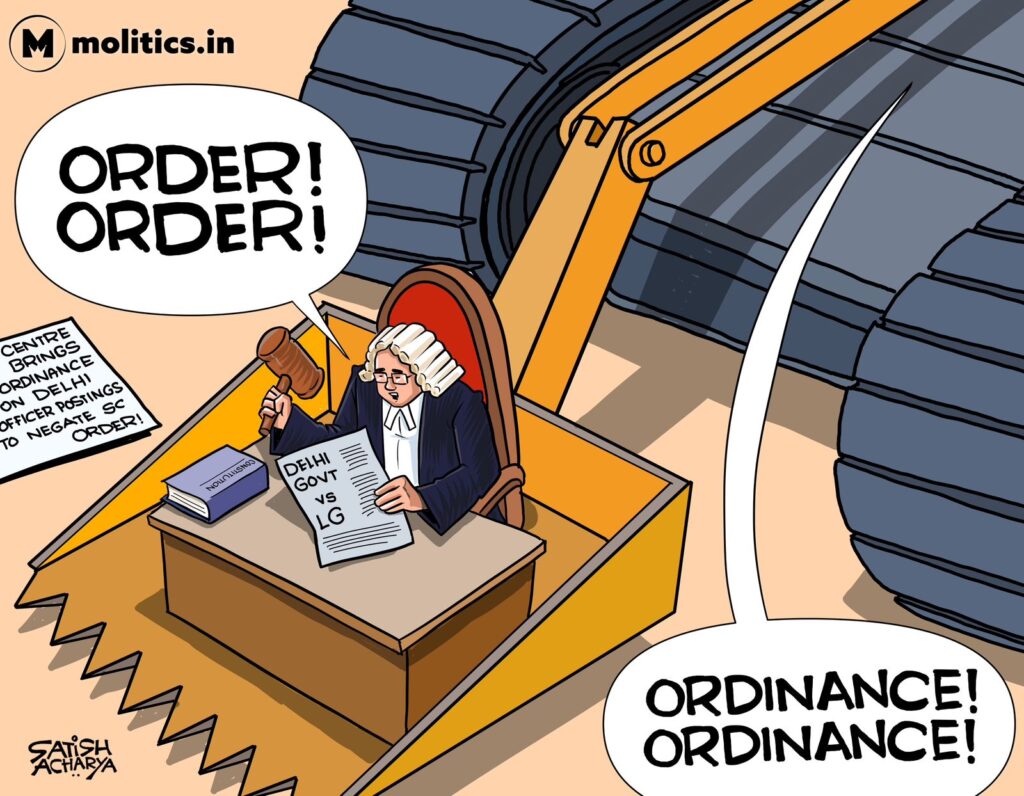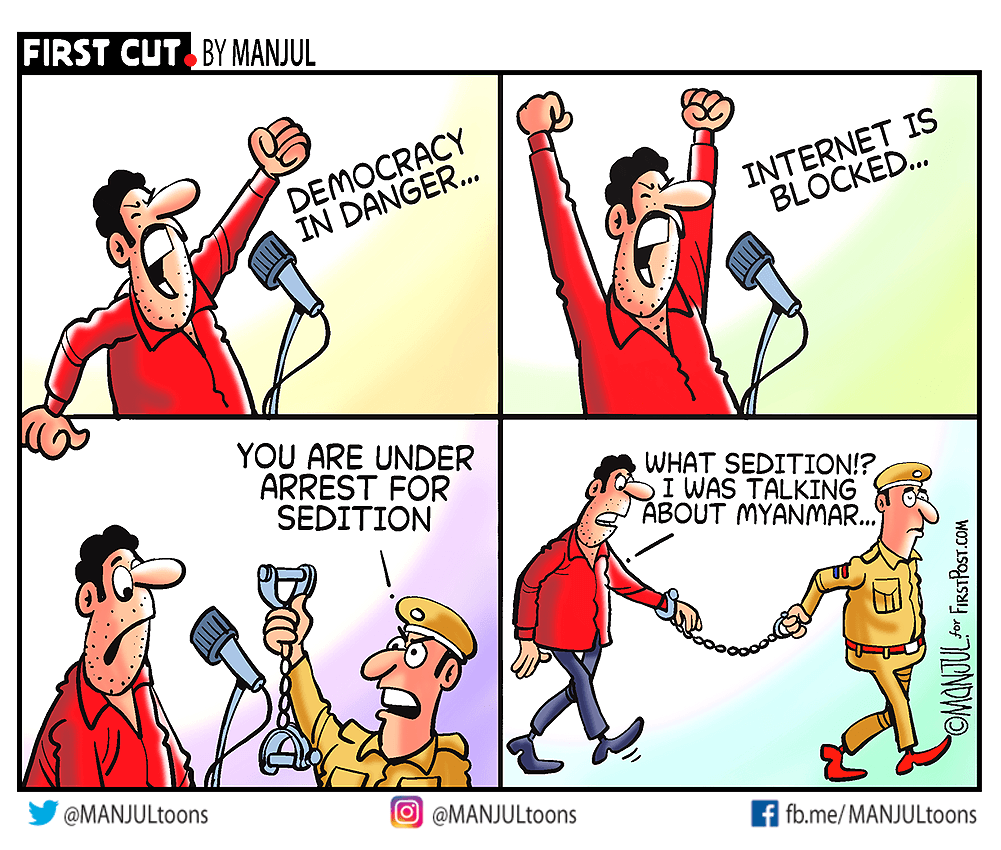Delhi Government, so close, yet so far! Part – 2

In the last post, we discussed Supreme Court’s 11th May judgement in Government of NCT of Delhi v Union of India. As a recap, the Court in the judgment again (see judgment from July, 2018) recognised the unique status of NCT of Delhi and held that:
- The Legislative Assembly of NCT of Delhi is competent to enact legislations over entries in List II and List III of the seventh schedule, except those entries which are expressly excluded by Article 239AA(3)(a) (Entries 1, 2 and 18).
- The executive power of NCT of Delhi is co-extensive with the legislative power of Legislative Assembly of NCT of Delhi.
- Considering Article 239AA(3)(b), Parliament has legislative competence “over all matters in List II and List III” in relation to NCT of Delhi, and laws made by the Parliament prevail over those made by the Legislative Assembly.
Therefore, although the Court was unequivocally of the opinion that Government of NCT of Delhi has executive control over services, its power is subject to legislation enacted by the Parliament. When the Court pronounced the judgment, the Parliament had not enacted any legislation to regulate services in Delhi. However on 19th May, the Union Government promulgated an ordinance (which has the same force and effect as a laws of Parliament), which effectively grants it control over civil servants in Delhi.
In this post, we unpack the ordinance and examine whether it is contrary to the judgment in Government of NCT of Delhi v Union of India. We are doing this exercise because the legislature cannot directly overrule a judgment but can remove the foundation of a judgment to make it ineffective (See Bahrul Islam v. Indian Medical Assocaition)
The Good.
The ordinance establishes an authority, namely National Capital Services Authority (‘Authority’), consisting of the democratically elected Chief Minister and two seniors civil servants (See Section 5). The authority is responsible for recommending to the Lietenant Governor (‘LG’), the transfer and posting, and sanctioning disciplinary proceedings of all Group A officers and officers of DANICS (a cadre). In case of a difference of opinion between the Authority and the LG, the opinion of the LG shall prevail.
Thus, as a result of the ordinance, a power which could previously only be exercised by the Government of NCT of Delhi (in view of the judgment in Government of NCT of Delhi v Union of India), will now be exercised by the Authority in the manner provided by the Ordinance. The question is whether this particular provision is contrary to the judgment or whether it removes its foundation. I would argue that it is the latter. The ordinance is in the nature of a legislation by the Parliament, which as the judgment itself says, can restrict the executive power of the Government of NCT of Delhi. This is entirely different from the notification of May 21st, 2015 which caused the stand-off between the Government of NCT of Delhi and the Union of India by conferring the LG control over civil servants in Delhi. While the effect of the ordinance is same as the of that the notification, the former is an exercise in legislative power (permissible) while the latter was an exercise of executive power (impermissible).
The Bad.
Union Government’s decision to undo the judgment of the Court through an ordniance, works in its favour (as explained above) but also against it. Article 123 of the Constitution of India permits the President (read Union Government) to promulgate an ordinance only if circumstances exist which “render it necessary for him to take immediate action”. This is an extraordinary power (See Krishna Kumar Singh v. State of Bihar). It is a deviation from the constitutional scheme, which only permits the legislature and not the executive to exercise legislative power. Thus, it must be exercised only in the manner prescribed in the Constitution. Here, it is unclear what were the circumstances which necessitated the Union Government to promulgate ordinance. The ordinance itself is silent on this point. The problem is that by the time the Supreme Court is asked to examine whether the ordinance was promulgated permissibly, the Parliament would pass a resolution affirming it.
The other glaring issue in the ordinance is Section 3, which inserts Section 3(A) in the Nactional Capital Territory of Delhi Act, 1991. Section 3A states:
“3A. Notwithstanding anything contained in any judgment, order, or decree of any Court, the Legislative Assembly shall have the power to make laws as per Article 239AA except with respect to any matter enumerated in Entry 41 of List II of the Seventh Schedule of the Constituion of India or any matter connected therewith or incidental thereto.”
This provision is directly contradictory to the judgment of the Supreme Court. The Supreme Court has categorically held that the Legislative Assembly of the NCT of Delhi does have the power to enact legislation on Entry 41 of List II (services). This power has been conferred by Article 239AA(3)(a). The Parliament cannot in exercise of its legislative, and not constituent powers, restrict the powers of the Legislative Assembly. The position of law after the judgment is that both the Parliament and the Legislative Assembly of NCT of Delhi can regulate the issue of services in Delhi. Any legislation by Legislative Assembly of NCT of Delhi shall be subject to legislation enacted by the Parliament. However, this does not mean that the Assembly cannot legislate. Thus, even after this ordinance, the Legislative Assembly of NCT of Delhi can regulate services as long as its legislation is not repugnant to this ordinance.
Conclusion
A lot of commentary on the ordinance has painted it with a broad-brush. Commentators have either questioned it in its entirety or supported it wholeheartedly (to be honest, this how most debates happen in the country). But there is nuance here. The issue is technical and at least legally, I do see the perspective of the Union Government (barring Section 3A). Beyond the law, I am concerned that the Parliament has such an overarching power with respect to Delhi. A proactive Parliament can really restrict what a democratically elected Government of NCT of Delhi can and cannot do. This renders the federal nature of our polity meaningless. The residents of Delhi lose control of what happens in their vicinity to the will of the rest of the country. But this is entirely because of Article 239AA(3)(b) of the Constitution which confers vast powers on the Parliament, and not much can be done regarding it.


